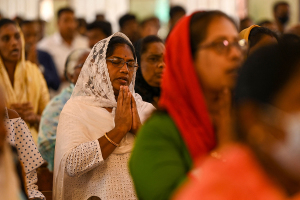'The New Gandhi' Emerges to Combat Corruption in India
Activists succeed in stumbling India's government
Activists across the United States are closely monitoring the successful campaign of Anna Hazare, a born-again Gandhian on a hunger strike to end government corruption in India, because his non-violent protests seem to be working.
The streets of India are now packed with anti-corruption crusaders, sandwich delivery men joining the hunger strike, and city walls painted with slogans slamming India’s growing corruption of bribery and favoritism that have become routine at all levels of government.
Hazare, an Indian activist using Gandhi-like techniques of non-violent protests against oppression, appeared weak after being released from prison on Saturday.
Hundreds surrounded Hazare on his fifth day of a 15-day fast that began Tuesday in jail after his arrest for planning a protest without police approval, the Times of India reports.
He only left the Tihar jail after he was granted permission by the authorities to complete his 15-day hunger strike in a city park.
Witnesses say the Indian authorities find themselves in an absurd, unwinnable situation, Indian blogs reported.
"I feel a little weak," Hazare said Saturday, after saying he lost about seven pounds since starting the fast.
"But there is nothing to worry about it. The fight will go on."
Some say the 74-year-old Anna Hazare is India’s next Gandhi because of his successful campaign maneuvers to end government corruption. He calls his plan a "revolution" and a "new freedom struggle."
In fact, Hazare's methods are so similar to that of Gandhi, his idol, that many in India now refer to him as "the new Gandhi," reports CBS News Correspondent Larry Miller.
"The funds in the government treasuries are ours," Hazare said Saturday from a stage outside the Tihar jail positioned in front of a giant photograph of Indian freedom fighter Mahatma Gandhi.
"The treasuries are not threatened by thieves but by those who guard it."
Hazare’s position is that the government's legislation proposal for the Jan Lokpal Bill is not strong enough.
The bill is also referred to as the citizens' ombudsman bill, which is a proposed anti-corruption law in India, according to Indian law.
The proposed legislation aims to effectively deter corruption, grievances of citizens, and protect whistle-blowers.
Interestingly enough, members of the U.S. Congress will return to Washington soon to again try to find a solution to heal the nation from its debt crisis and lack of employment for Americans.
After returning to their districts this time around, lawmakers faced angry constituents, flash mobs, protestors, and hecklers. The backlash from their districts somehow reflects the global discontent with government spending and process, including the accusations of corruption in India.
"If Americans were to hold some kind of hunger strike until our lazy lawmakers came up with a solution to stop big spending and save our jobs maybe they would pay attention," said Ralph Noble, a resident of New Orleans following the story in India.
"I find it interesting that Hazare's plan has the officials over there fumbling around. Seems to me his kind of plan works."
If made into law, the proposed bill in India would create more independence for the people and form an election commission. Hazare and his team desire to combat corruption, he proposes a new body, independent of government, which would administer high-speed justice.
It would have the power to investigate and prosecute government officers, judges and politicians – even the prime minister.
Since the 1990s, India has changed faster than at any point in its history, The Telegraph reports.
India is also the second most populous country in the world, with more than 1.21 billion people within its borders.
But, India is different than other countries. China, which depends on exports, is not made up like the Indian process.
Billionaires are everywhere in India, but hundreds of millions in the starving country remain trapped in tragic poverty. However, there is a new ambitious and assertive middle class rising up from the large population.
The list of grievances against India’s government is long and getting longer and this new middle class is determined to fight for injustices.
The Telegraph and the Times of India both report that the police and the Central Bureau of Investigation are often incompetent or corrupt. The legal system is slow, and almost a third of senior judicial appointments are unfilled.
Right now, the basic mechanisms for chasing corruption, whether at state or at national level, do not function properly.
Anna Hazare is all about methods, which has a promise of making the villagers more self-sufficient.
Earlier, the same village witnessed alcoholism, utter poverty and migration to urban slums.
Inspired by Hazare’s unique approach of salvaging a hopeless village, the state government has implemented the “Model Village” scheme as part of its official strategy.
Due to his recent message, Hazare is now synonymous with rural development in India, The Times reports.
For the life history of Mohandas Karamchand Gandhi who was born in the town of Porbander in the state of what is now Gujarat on October 2, 1869 visit: http://www.sscnet.ucla.edu/southasia/Religions/religions.html.
For Anna Hazare, visit his website: http://www.annahazare.org/
Hazare is well known and respected in India for upgrading the ecology and economy of the village of Ralegan Siddhi, which is located in the drought prone Ahmednagar district of Maharashtra state.
The erstwhile barren village has metamorphosed into a unique model of rural development due to its effective water conservation methods, which made the villagers self-sufficient.
Earlier, the same village witnessed alcoholism, utter poverty and migration to urban slums, but was inspired by Hazare’s unique approach to salvage the hopeless village.





























